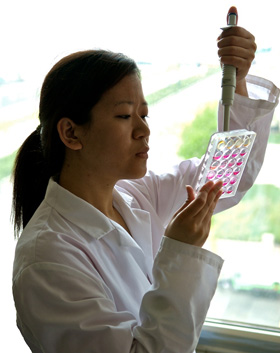
Over the past year, more than a dozen BMCC students were involved in a laboratory study of how two chemicals associated with many foods can protect the body from against cancer. Tenzin Yeshi, one of those students, who gained proficiency in laboratory techniques, was selected from a pool of approximately 500 applicants to attend the NIH Summer Research Fellowship Program at UMASS Medical School.
Born in Nepal, Yeshi arrived in the U.S. in 2003 and enrolled at BMCC two years later. Yeshi called her BMCC faculty mentors, Sarah Salm, Patricia Deleon, and Lauren Goodwyn, “hands-on faculty who have certainly enhanced my educational experience and especially my laboratory skills.” Yeshi is eying a career in medicine and is now attending City University’s Hunter College after graduating from BMCC in May.
Yeshi Researches “Transcription Factors”
During the summer Yeshi worked in the laboratory of Dr. Michael Brodsky at UMASS Medical School and her project involved determining the DNA binding specificity of transcription factors using a bacterial one-hybrid (B1H) system.
Transcription factors are key proteins that bind to specific parts of the DNA and are part of the system that controls the transfer (or transcription) of genetic information from the DNA to RNA. These proteins bind to particular regions of the DNA (DNA binding sites), and control the expression of various genes within the genome (the entire hereditary information of an organism encoded in the DNA).
Dr. Brodsky’s research group studies transcription factors in the fruit fly, Drosophila melanogaster, and many genes in this fly are also found in humans. About 75% of genes associated with human genetic diseases are also found in D. melanogaster (such genes are referred to as homologues).
The Fruit Fly and the Regulation of Gene Expression
Yeshi, with her peers in Dr. Brodsky’s laboratory, and under the guidance of Adam Richards, investigated the transcription factors, Giant, which regulates early embryonic development in Drosophila, and Fos/Jun, which regulates damaged DNA repair, to confirm the DNA binding sites of these transcription factors. The group verified previously identified binding sites for these transcription factors.

